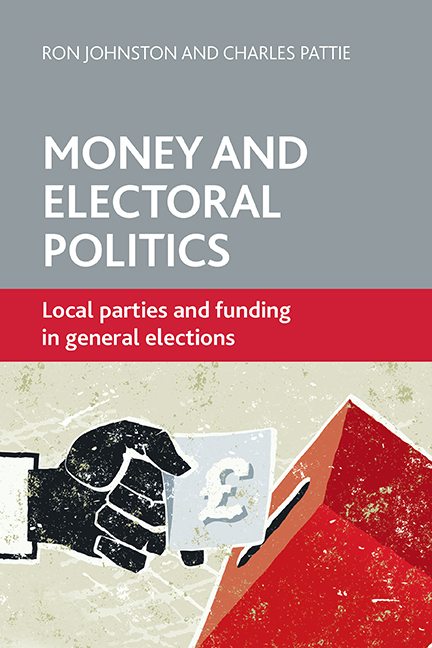Book contents
- Frontmatter
- Contents
- List of tables and figures
- About the authors
- Introduction
- one Follow the money: cash, party and electioneering in Britain
- two Money matters: local campaigns at British general elections
- three The financial health of local parties: the key to electoral success?
- four Raising the money: donations to local parties
- five Party funding futures
- In conclusion
- References
- Index
two - Money matters: local campaigns at British general elections
Published online by Cambridge University Press: 24 February 2022
- Frontmatter
- Contents
- List of tables and figures
- About the authors
- Introduction
- one Follow the money: cash, party and electioneering in Britain
- two Money matters: local campaigns at British general elections
- three The financial health of local parties: the key to electoral success?
- four Raising the money: donations to local parties
- five Party funding futures
- In conclusion
- References
- Index
Summary
The nature of British general elections has altered very markedly over the last century, but the law regarding how much candidates can spend on their constituency campaigns has hardly changed at all. In the 19th century, although many candidates stood on a party label there was virtually no party-focused campaigning; each candidate fought his own campaign on a local basis, with some reference to national issues but little call for the voters to ensure that a particular party was able to form a government.
At the beginning of that century, most candidates were seeking election from constituencies with relatively small numbers of registered voters – especially in the so-called ‘rotten boroughs’. With neither a secret ballot nor restrictions on the nature of the campaigning, the potential for corruption was large – and frequently realised, particularly through a practice known as ‘treating’ whereby votes were solicited via, for example, the provision of drink and food by the candidates. As the franchise was extended by the three Reform Acts passed during that century, and the related redistributions of constituencies eliminated most of those with very small electorates, the potential cost of treating increased – giving an advantage to wealthier candidates.
Secret ballots were introduced in the Ballot Act 1872, and regulation of candidates’ expenditure by the Corrupt and Illegal Practices Act 1883, whose provisions included limitations on the amount that could be spent on a campaign. (For general introductions to this legislation, see Pinto-Duschinsky, 1981, and Johnston, 1987.) A maximum amount was specified for each of eight types of constituency, as follows:
English, Scottish and Welsh borough seats:
With less than 2,000 electors – £350
With 2,000 or more electors – £380, plus £30 for each additional
1,000 electors.
English, Scottish and Welsh county seats:
With less than 2,000 electors – £650
With 2,000 or more electors – £710, plus £60 for each additional
1,000 electors.
Irish borough seats:
With less than 500 electors – £200
With 500-1,000 electors – £250
With 1,000 or more electors – £275, plus £30 for each additional
1,000 electors.
Irish county seats:
With less than 2,000 electors – £500
With 2,000 or more electors – £540, plus £40 for each additional
1,000 electors.
- Type
- Chapter
- Information
- Money and Electoral PoliticsLocal Parties and Funding at General Elections, pp. 33 - 84Publisher: Bristol University PressPrint publication year: 2014



